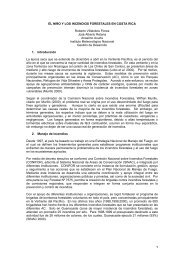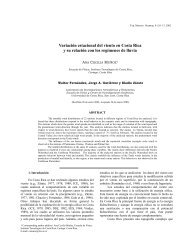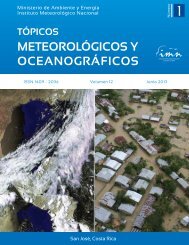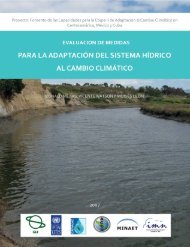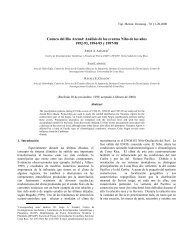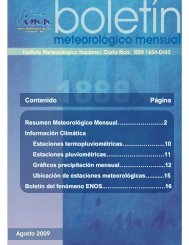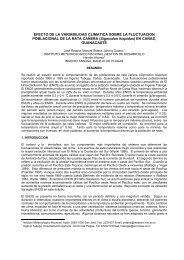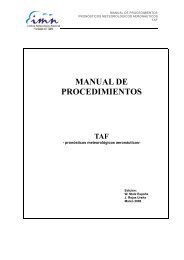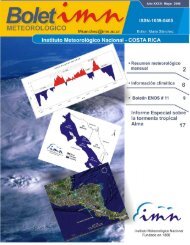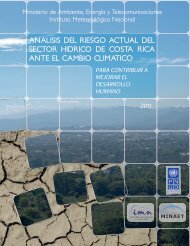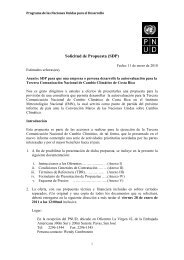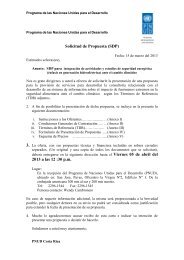- Page 2 and 3: Costa Rica 2009 Segunda Comunicaci
- Page 4 and 5: CONTENIDO 5 Prólogo...............
- Page 6 and 7: 7 5.6 Sectores y sistemas evaluados
- Page 8 and 9: Cuadro 4.1 Propuesta de políticas
- Page 10 and 11: 11 Figura 4.3 Costa Rica. Emisiones
- Page 12 and 13: PRÓLOGO 13 Los impactos del cambio
- Page 14 and 15: 15 EXECUTIVE SUMMARY This executive
- Page 16 and 17: 17 Environmental Services (PSA) pro
- Page 18 and 19: 19 Convention and the Designated Na
- Page 20 and 21: 21 a high potential for GHG emissio
- Page 24 and 25: 25 Figure i.3: Climate change preci
- Page 26 and 27: 27 Water resources Costa Rica condu
- Page 28 and 29: 29 Table i.5: Identified adaptation
- Page 30 and 31: 31 Table i.6: Expected changes in t
- Page 32 and 33: 33 Public Health One of the sectors
- Page 34 and 35: 35 Technology Transfer The relative
- Page 36 and 37: 37 years on the matter, mainly by t
- Page 38 and 39: 39 Research, projects and academic
- Page 40 and 41: 41 1990 al 71,2% en 2007. En ese mi
- Page 42 and 43: 43 Cuadro i.2: Emisiones totales de
- Page 44 and 45: 45 Figura i.1 Estrategia Nacional d
- Page 46 and 47: 47 Figura i.2: Costa Rica. Emisione
- Page 48 and 49: 49 Cuadro i.3: Evidencias próximas
- Page 50 and 51: 51 Figura i.3: Escenarios de cambio
- Page 52 and 53: 53 Proyecciones futuras del clima e
- Page 54 and 55: 55 Cuadro i.5: Medidas de adaptaci
- Page 56 and 57: 57 Un análisis sobre el efecto del
- Page 58 and 59: 59 de la información generada que
- Page 60 and 61: 61 Figura i.7 Cantones de mayor exp
- Page 62 and 63: 63 La red hidrometeorológica y cli
- Page 64 and 65: 65 c) ubicarlas en sitios con buena
- Page 66 and 67: CAPÍTULO 1 Circunstancias Nacional
- Page 68 and 69: 69 gas de las aguas residuales indu
- Page 70 and 71: 71 Cuadro 1.2: Indicadores demográ
- Page 72 and 73:
73 años anteriores, pero sigue sie
- Page 74 and 75:
75 A inicios del 2007, en materia d
- Page 76 and 77:
77 óptimo. Así, se evalúa exhaus
- Page 78 and 79:
CAPÍTULO 2 Inventario Nacional de
- Page 80 and 81:
81 Una parte integral para identifi
- Page 82 and 83:
83 En el caso específico de Costa
- Page 84 and 85:
85 2.4 Procesos Industriales Existe
- Page 86 and 87:
87 En la figura 2.2 se presenta la
- Page 88 and 89:
89 Figura 2.3 Disposición final de
- Page 90 and 91:
91 • Beneficios de café • Inge
- Page 92 and 93:
CAPÍTULO 3 Políticas, medidas ado
- Page 94 and 95:
95 3.2 Nivel Nacional 3.2.1 Marco l
- Page 96 and 97:
97 - Programa de Ordenamiento Terri
- Page 98 and 99:
99 2. Impulsar la creación de un s
- Page 100 and 101:
101 rentes sectores de la sociedad
- Page 102 and 103:
103 de métodos alternativos como l
- Page 104 and 105:
105 Figura 4.1: Ejes principales de
- Page 106 and 107:
107 Política Área Medidas Interna
- Page 108 and 109:
109 Cuadro 4.2: Propuesta de polít
- Page 110 and 111:
111 Cuadro 4.3: Propuesta de polít
- Page 112 and 113:
113 Cuadro 4.4: Propuesta de polít
- Page 114 and 115:
115 4.3 Opciones de Mitigación de
- Page 116 and 117:
117 Un importante hallazgo, desde e
- Page 118 and 119:
119 Figura 4.2: Costa Rica. Distrib
- Page 120 and 121:
121 En ese sentido, la alternativa
- Page 122 and 123:
123 Figura 4.5:Opción de Mitigaci
- Page 124 and 125:
125 4.4 Mecanismo de Desarrollo Lim
- Page 126 and 127:
127 identificar los principales tip
- Page 128 and 129:
129 Con respecto a los Cuadros 5.2
- Page 130 and 131:
131 Cuadro 5.4: Eventos extremos en
- Page 132 and 133:
133 Estos fenómenos en conjunto, p
- Page 134 and 135:
135 estacionales que coinciden con
- Page 136 and 137:
137 Figura 5.4 Comportamiento del F
- Page 138 and 139:
139 5.2.5 Tornados En Costa Rica so
- Page 140 and 141:
141 En la siguiente figura se prese
- Page 142 and 143:
143 Sistema Zona Observación Relac
- Page 144 and 145:
145 5.4 Proyecciones futuras del cl
- Page 146 and 147:
147 5.4.1 Análisis regional: Pací
- Page 148 and 149:
149 5.4.3 Análisis regional: Pací
- Page 150 and 151:
151 Figura 5.15: Escenarios de camb
- Page 152 and 153:
153 Figura 5.18: Escenarios de camb
- Page 154 and 155:
155 beta, y una precaria infraestru
- Page 156 and 157:
157 En el área del proyecto no exi
- Page 158 and 159:
159 5.6.1.1 Medidas de adaptación
- Page 160 and 161:
161 Sector Servicios públicos Medi
- Page 162 and 163:
163 5.6.2 Conocimiento, estado actu
- Page 164 and 165:
165 individuos adultos de 6 especie
- Page 166 and 167:
167 5.6.2.2 Cambio climático y bio
- Page 168 and 169:
169 Los mapas de distribución pote
- Page 170 and 171:
171 el país producen más efectos
- Page 172 and 173:
173 cambio climático. - Fortalecim
- Page 174 and 175:
175 Cuadro 5.14: Cantones con mayor
- Page 176 and 177:
177 Figura 5.24 Impacto económico
- Page 178 and 179:
179 Figura 5.26: Impacto económico
- Page 180 and 181:
181 Figura 5.28: Casos mensuales de
- Page 182 and 183:
183 5.6.3.4 Enfermedades cardiovasc
- Page 184 and 185:
185 Figura 5.32: Incidencia de diar
- Page 186 and 187:
187 5.6.3.6 Angiostrongilosis abdom
- Page 188 and 189:
189 Figura 5.36: Tasa de Angiostron
- Page 190 and 191:
191 Cuadro 5.17: Vulnerabilidad int
- Page 192 and 193:
193 CAPÍTULO 6 Transferencia de te
- Page 194 and 195:
195 6.3 Sectores con potencial de m
- Page 196 and 197:
197 Figura 6.5: Costa Rica. Emision
- Page 198 and 199:
199 Esta tecnología tiene la venta
- Page 200 and 201:
201 Se estima que la incorporación
- Page 202 and 203:
203 Figura 6.11: Costa Rica. Reducc
- Page 204 and 205:
205 Si se combinan las tecnologías
- Page 206 and 207:
207 Figura 6.13 Diagrama de reducci
- Page 208 and 209:
209 Figura 6.14: Costa Rica. Emisio
- Page 210 and 211:
211 aún en investigación y desarr
- Page 212 and 213:
213 Mareas: Busca aprovechar la ene
- Page 214 and 215:
215 En 1883, la entonces Oficina de
- Page 216 and 217:
217 red con fines de cambio climát
- Page 218 and 219:
219 radiosondeo y mide variables at
- Page 220 and 221:
221 datos medidos en una estación
- Page 222 and 223:
223 Cuadro 7.1: Variables climátic
- Page 224 and 225:
225 una base de datos específica y
- Page 226 and 227:
227 7.1.5.3 Estación de la atmósf
- Page 228 and 229:
229 7.2 Reforzamiento de la red hid
- Page 230 and 231:
231 de observación nacional con un
- Page 232 and 233:
233 dose de lo anterior una serie b
- Page 234 and 235:
235 Cuadro 8.1: Programas de invest
- Page 236 and 237:
237 Institución Proyecto/estudio
- Page 238 and 239:
239 Institución Proyecto/estudio
- Page 240 and 241:
241 En la página web http://cgloba
- Page 242 and 243:
243 CAPÍTULO 9 Bibliografía Capí
- Page 244 and 245:
245 Fournier, M.L. 2003. Uso de pla
- Page 246 and 247:
247 PRODUS (Programa de Investigaci
- Page 248 and 249:
249 BIODIVERSIDAD Alpízar, E.; Cas
- Page 250 and 251:
251 IPCC, 2007: Climate Change 2007
- Page 252 and 253:
253 bientes Marinos Costeros de Cos
- Page 254 and 255:
255 Cantero, M.; Fonseca, P. 2007.
- Page 256 and 257:
257 Pereira, M. 2001. Caracterizaci
- Page 258 and 259:
259 yecto de Cambio Climático. Inf
- Page 260 and 261:
261 presentado al Instituto Meteoro
- Page 262 and 263:
263 IMN: Instituto Meteorológico N
- Page 265:
Este libro se imprimió en el mes d



